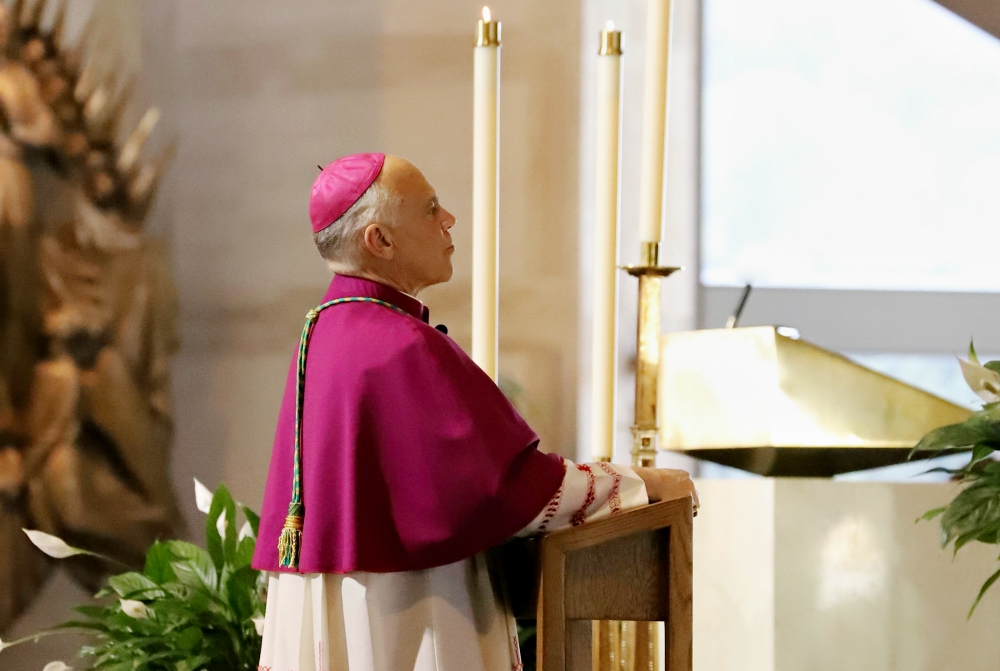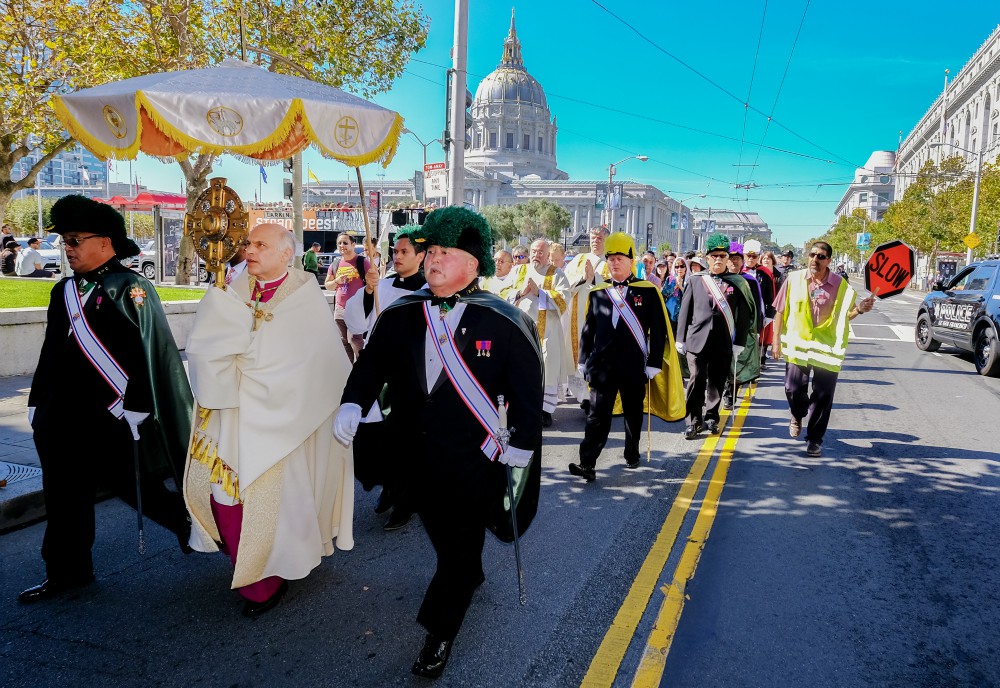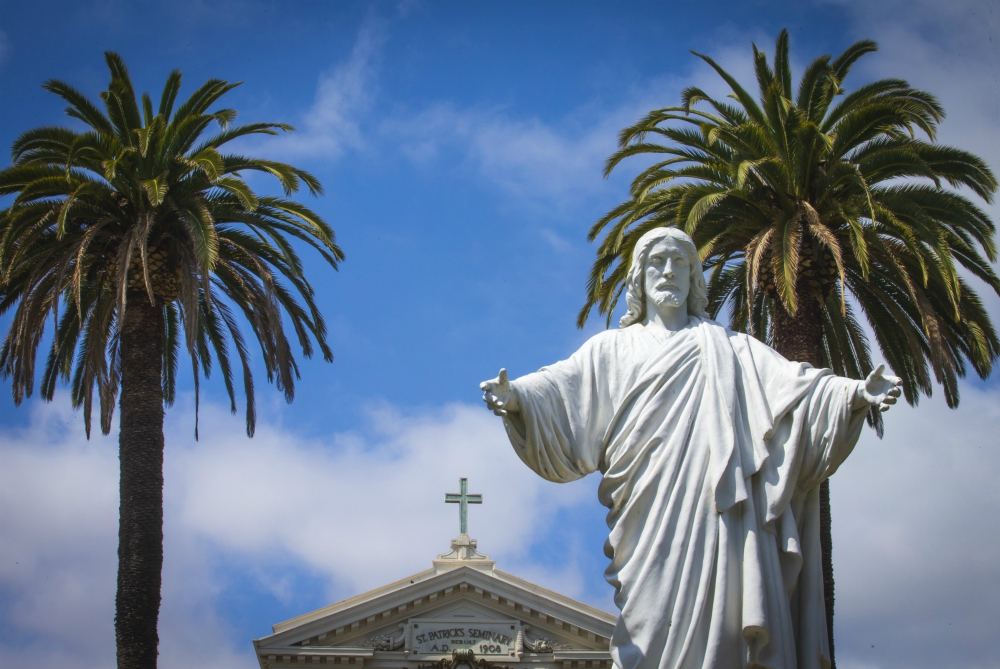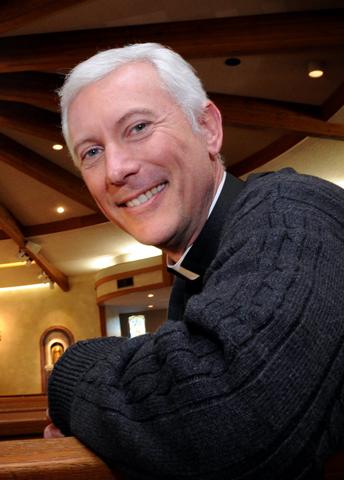
San Francisco Archbishop Salvatore Cordileone leads the rosary at the Cathedral of St. Mary of the Assumption before Mass to conclude the Novena for Life Aug. 11. (CNS/Archdiocese of San Francisco Office of Human Life & Dignity/Debra Greenblat)
Simmering acrimony over the decision-making, communications and mindset of the much-watched seven-year episcopacy of San Francisco Archbishop Salvatore Cordileone breached the surface of an early October convocation of clergy, surprising many and leaving questions about the future between the prelate and much of his presbyterate.
At one point during the Sept. 30-Oct. 3 gathering at Asilomar Conference Grounds in Pacific Grove, California, Cordileone is said to have said, "I do not understand you, and you do not understand me," while he also told the 145 priests attending, "I love you."
A summary of the assembly prepared by its organizing committee for the Oct. 10 regular meeting of the archdiocesan Presbyteral Council synthesized the key deliberations:
"On Tuesday evening [Oct. 1], the group seemed to come to a near consensus that the priests of the Archdiocese desire greater communication and collaboration with the Archbishop in making key decisions."
Missing, however, was the depth of emotion and frustration expressed during general session exchanges at which the archbishop and moderator of the curia, Jesuit Fr. John Piderit, were not present, several participants told NCR.
Laid bare, they said, were tensions over muddy communications, lack of authentic consultation, low clergy morale, unilateral initiatives by Cordileone, and the archbishop's embrace of "the model of a pre-Vatican II church," in the words of one pastor.
Words such as "bombshell," "volatile," "anger" and "pain" were used in recounting general session comments.

Archbishop Salvatore Cordileone carries the monstrance as he leads hundreds of Catholics through San Francisco streets in a eucharistic procession Oct. 8, 2016. (CNS/Catholic San Francisco/Dennis Callahan)
Some attendees, however, told NCR that Cordileone enjoys steady clerical "appreciation and agreement" with his ecclesiology among many priests, notably younger men.
Fr. Roger Gustafson, chair of the organizing committee, said he was "very encouraged by the results" of the conference.
"While it was painful at points to facilitate an honest discussion about some of the issues in the relationship between the priests and archdiocesan leadership," he wrote in an email, "I am convinced that the process ultimately will result in positive improvements with respect to morale, communication, mutual understanding, and most importantly greater effectiveness in priestly ministry."
Noting that the gathering followed a format pioneered by Patrick Lencioni, founder of the Amazing Parish program, Gustafson said he hoped an impression would not emerge that the convocation was "only two polarized groups of priests when it seems to me that the majority fall somewhere in the middle and are open to moving forward."
"To my mind," Gustafson, pastor of San Francisco's St. Brendan Parish, told NCR, "the convocation accomplished the first step of intentionally bringing conflict out into the open so that it can be dealt with. We are now moving to the second step of putting structures into place to address the underlying basis of the conflict."
"Inviting the archbishop to dinner is not going to solve the communications problem."
A priest who has expressed concerns about priest morale in the past said that the objective should "not be to shame the archbishop, but to improve the archdiocese. I would like this to have a chance to unfold under the best of conditions."
The assembly was the third such gathering since Cordileone was installed on Oct. 4, 2012, and apparently the best-attended and most free-wheeling.
Central to deliberations were deanery-defined table-group discussions.
According to participants, conversations among groups of six to eight at about two dozen tables reached consensus Oct. 1 when each group was directed to share one item for immediate attention by archdiocesan administrators.
"It was like boom, boom, boom" as the results were announced, said one participant. "Nearly every table named poor communications from the archbishop and chancery — and exclusion of priests from key decisions in the archdiocese."
"Honestly, I was stunned by the frankness," the priest added, "and this included tables where there were young guys who see the archbishop as doing nothing wrong. I did not expect this kind of consensus."
The organizing committee's summary said that consultants from the Evangelium Consulting Group "suggested a pilot program in which one deanery be selected to meet regularly with the Archbishop to provide advice and counsel and this mechanism seemed to receive widespread approval."
Advertisement
One priest said he hoped the pilot project and overall meeting would encourage "greater fraternity, cohesion, trust, healthy conflict, communication and collegiality, not only between the archbishop and his priests ... but also among the priests themselves."
Others were skeptical. "Inviting the archbishop to dinner is not going to solve the communications problem," said one. "Long term, there is probably not going to be much change unless the archbishop changes lanes, and that would be going against everything he has been doing so far."
More bluntly, another veteran pastor pronounced the convocation "an elaborate exercise in futility."
Cordileone apparently did not directly respond to the priests' concerns Oct. 2 until after he had spoken at length about topics close to him, including St. Patrick's Seminary and University, stewardship, and liturgical celebration as encouraged at the Benedict XVI Institute for Sacred Music and Divine Worship, which he established on the seminary's Menlo Park campus.
Some priests found the delay disconcerting.
When the archbishop did address the communications and decision-making questions, priests told NCR that, in the words of one, "he made it pretty clear we were wrong and we did not understand the way he makes decisions."
"Some guys were disheartened, and a handful just left quietly, dismissing themselves from the meeting," the priest continued.
He and others described as "a kind of breakthrough moment" when Cordileone "basically said, 'I do not understand you and you do not understand me,' " but also added, "I love you."
Gustafson and others lauded Cordileone for being "vulnerable" and leading the sharing of personal reflections and history during the sessions aimed at community-building among priests.
Cordileone "basically said, 'I do not understand you and you do not understand me,' " but also added, "I love you."
"I admire the archbishop for his courage," commented Gustafson. "I can only assume that many, if not most, dioceses have similar areas of tension and concern, and I imagine there are many prelates who would never allow such an open and sincere discussion. ... Overall, it was a very positive experience."
Not for others, including Fr. David Ghiorso, pastor of St. Charles Parish in San Carlos, California*, who has publicly questioned Cordileone's actions in the past.
"The core issue that surfaced for me is lack of trust in the administration of the archdiocese," he emailed NCR. "I am not sure if others feel the same. With lack of trust comes lack of respect and this is very difficult to deal with as a priest. We do promise respect and obedience to our bishop and when that is not present it is a problem."
"At one point as the archbishop spoke of the Benedict XVI Institute, I got the image of the Titanic going down, but the choir chanting on the bow of the ship," Ghiorso said. Cordileone's affinity for Latin liturgy and Gregorian chant is well-known.
Ghiorso called himself "a passive observer in the general sessions by choice" and noted he had "promised my team back at the parish that I would keep my mouth shut for my own mental, spiritual and emotional health."
"Do I believe anything will come from this gathering?" he asked. "The answer is, 'No.' Promises of sending out the results of the general session will never happen because they were so volatile."
Observed another: "The level of the display of hardcore criticism against the archbishop throughout the convocation was revealing but not surprising. Most priests now know they are not alone in their estrangement from the archbishop. The archbishop has consistently attempted to move the archdiocese back into the 19th century. The seminary is a prime example."

A statue of Jesus greets visitors at St. Patrick's Seminary & University in Menlo Park, California, in May. (CNS/Chaz Muth)
In 2013, Cordileone stunned St. Patrick's Seminary faculty, students and others by forcing the resignation of its president-rector, one of a series of events leading to the Society of the Priests of St. Sulpice withdrawing from the school in 2016 after 114 years. Neither the Sulpician U.S. province nor the seminary board had been consulted about the president-rector's departure.
As of Oct. 31, requests for comment from Cordileone were unsuccessful.
A retired priest told NCR, "The priests I talked to had the impression that Sal lives in his own world, cut off from what is real, and they feel helpless to find some relief from present church structure. At least the archbishop knows that he is not supported by his priests."
That retired priest, however, would belong to what Fr. Joseph Illo calls "a powerful, well-established older group of priests who have worked decades in the archdiocese and done much good work over the years, but who are having trouble accepting changes in our local church, and especially with a new archbishop."
A Cordileone loyalist, Illo asserted that "most priests are with the archbishop and share his ecclesiology in general" and that "if you took an anonymous poll ... I'm quite sure that well over half the clergy would express appreciation and agreement with the archbishop's theology. This is particularly true of priests under 40."

Fr. Joseph Illo (Newscom/ZUMAPRESS/Bart Ah You)
No immediate headcount for 40-and-younger ordained was available, but an archdiocesan official told NCR, "Not very many."
About 385 priests serve within the archdiocese, according to archdiocesan communications director Mike Brown.
Almost half are incardinated archdiocesan priests who have a median age of 67. Just under 40% of the balance are religious order members, and another 55 are from other dioceses.
Illo acknowledged the convocation exposed "concern that the moderator of the curia is not listening well ... to priests in parishes, and that he wields too much power with the archbishop."
Convocation interventions and priests' comments repeatedly portrayed Cordileone as having encased himself within a circle of like-minded persons, often from outside the archdiocese.
However, wrote Illo in an email, "San Francisco is the third diocese in which I have worked over 30 years. It's not essentially different from Los Angeles and Stockton in terms of morale and the challenges faced between chancery and parishes."
"I will say that it seems priests are less united among themselves in San Francisco ... less likely to spend days off together or go on vacations together, to pray regularly together and work together on common projects," he added. "We San Francisco clergy have less esprit de corps than other dioceses. The archbishop has acknowledged his responsibility to build presbyteral unity, but also mentioned that he cannot force us to like and love each other."
Recruited by Cordileone from the Diocese of Stockton, California, Illo himself has been at the center of controversy since nearly his arrival as administrator of San Francisco's Star of the Sea Parish in August 2014.
Fr. Jose Shaji, pastor of St. Anselm Parish in Ross, north of San Francisco, predicted "nothing" will ultimately result from the Asilomar gathering despite the frank feedback it generated.
After an Oct. 6 evening mass, Shaji asked parishioners to pray for priests of the archdiocese, saying that clerical morale was the lowest he had experienced in his 17 years in the see.
"When I arrived here," the native of India told NCR, "it was like coming home. But now it feels more like a place of employment."
Then-Archbishop William Levada headed the archdiocese when Shaji arrived, succeeded in 2005 by Archbishop George Niederauer, who retired in 2012 and died in 2017. Later named a cardinal and head of the Vatican's powerful Congregation for the Doctrine of the Faith, Levada died Sept. 26 of this year.
A longstanding pastor who attended the convocation said many "see this as kind of a last chance, and the guys are not going to drink from this well again," an allusion to past encouragement to speak openly only to be ignored or marginalized.
Cordileone's tenure has been marked with headline-generating events, including:
- An attempt to modify faculty handbooks of the four archdiocesan-owned high schools to emphasize cathechism language on reproductive and gender issues. The move, among other things, led to a full-page ad in the San Francisco Chronicle calling for the archbishop's removal.
- Without known consultation and little awareness of the archdiocesan Schools Department, establishment of an Office of Catholic Identity Assessment to monitor and stimulate Catholicity at Catholic high schools.
- Nearly five years of controversy at San Francisco's Star of the Sea School following Illo's appointment; its closure was announced earlier this year.
[Veteran Catholic journalist Dan Morris-Young is based in the Pacific Northwest.]
* This article has been edited to correct the location of St. Charles Parish.








